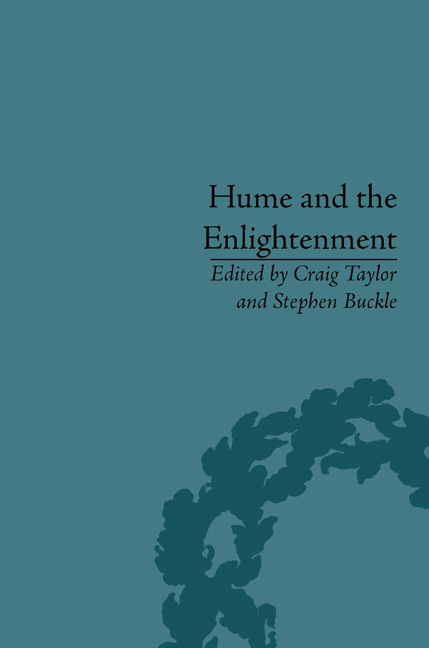Book contents
- Frontmatter
- CONTENTS
- Acknowledgements
- List of Contributors
- Abbreviations
- Introduction: Hume and his Intellectual Legacy
- 1 Hume and the Enlightenment
- 2 Will the Real Enlightenment Historian Please Stand Up? Catharine Macaulay versus David Hume
- 3 Philosophy, Historiography and the Enlightenment: A Response to Green
- 4 Hume's Enlightenment Aesthetics and Philosophy of Mathematics
- 5 Part 9 of Hume's Dialogues and ‘The Accurate Philosophical Turn of Cleanthes
- 6 ‘Strange Lengths’: Hume and Satire in the Dialogues Concerning Natural Religion
- 7 A Modern Malignant Demon? Hume's Scepticism with regard to Reason (Partly) Vindicated
- 8 Hume on Sympathy and Cruelty
- 9 Hume's Natural History of Justice
- 10 Hume and Rawls on the Stability of a Society's System of Justice
- 11 Can Hume's Impressions of Reflection Represent?
- 12 Mechanism and Thought Formation: Hume's Emancipatory Scepticism
- Notes
- Works Cited
- Index
Introduction: Hume and his Intellectual Legacy
- Frontmatter
- CONTENTS
- Acknowledgements
- List of Contributors
- Abbreviations
- Introduction: Hume and his Intellectual Legacy
- 1 Hume and the Enlightenment
- 2 Will the Real Enlightenment Historian Please Stand Up? Catharine Macaulay versus David Hume
- 3 Philosophy, Historiography and the Enlightenment: A Response to Green
- 4 Hume's Enlightenment Aesthetics and Philosophy of Mathematics
- 5 Part 9 of Hume's Dialogues and ‘The Accurate Philosophical Turn of Cleanthes
- 6 ‘Strange Lengths’: Hume and Satire in the Dialogues Concerning Natural Religion
- 7 A Modern Malignant Demon? Hume's Scepticism with regard to Reason (Partly) Vindicated
- 8 Hume on Sympathy and Cruelty
- 9 Hume's Natural History of Justice
- 10 Hume and Rawls on the Stability of a Society's System of Justice
- 11 Can Hume's Impressions of Reflection Represent?
- 12 Mechanism and Thought Formation: Hume's Emancipatory Scepticism
- Notes
- Works Cited
- Index
Summary
David Hume (1711–76) is commonly regarded as the greatest of the British philosophers, albeit more for being a destroyer than a builder. His philosophy rejects the enthronement of reason so characteristic of the western philosophical tradition, and replaces it with a naturalistic picture in which the human being is portrayed as a creature of imagination, passion and habit. The consequence is that we must accept some form of scepticism, such that we can be guided only by opinion, not by knowledge. This is not a form of philosophical quietism, however, since scepticism can establish standards of probability, and so have a critical edge. Thus Hume deployed his conclusions in a critique of religious arguments: most famously in his essay on miracles, but also in critical examinations of belief in divine design and, more generally, of divine causation of the world. His political writings are cautious, but undeniably modernist; and his economic writings helped pave the way for the achievements of his younger contemporary, Adam Smith. In fact, he and Smith are commonly linked, as two of the greatest contributors to that Scottish intellectual flowering after the Act of Union of 1707, now known as the Scottish Enlightenment.
However, to place Hume in this way, as a contributor to Enlightenment in its Scottish form, is to raise a problem.
- Type
- Chapter
- Information
- Hume and the Enlightenment , pp. 1 - 12Publisher: Pickering & ChattoFirst published in: 2014



